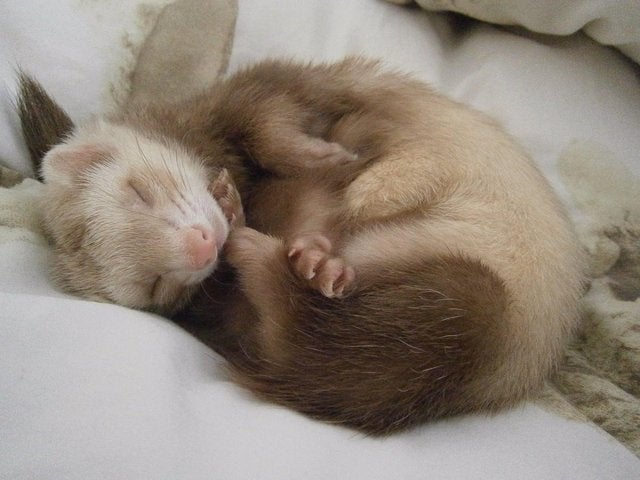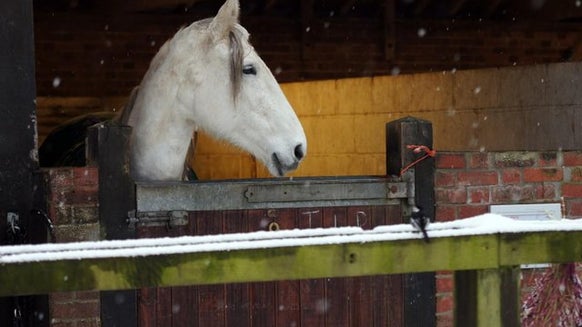Ferret Care: Basic Dos and Don’ts

Ferrets are wonderful pets due to their energetic and curious personalities, but the little bundles of fun do carry quite a lot of responsibility. They are very social animals and prefer to be within small groups, so it’s recommended that you adopt a pair of ferrets so they have a friend to play with. In addition to that, they are extremely intelligent pets that require quite a lot of attention – at least two hours of play outside their cage every day.
During the time they are playing, ferrets can display very robust and inquisitive behaviour that is a lot of fun to watch. However, ferrets must be handled with care and maturity if they are to be as happy as possible, so therefore they are more suited to families that have older children who can learn how to treat their pet.

The Dos and Don'ts When Caring For Your Ferret
To ensure that your furry friend is as happy as possible, start by following these simple ‘Dos’ and the ‘Don’ts’:
- Ferrets can spend up to 18 hours a day sleeping! However, this is divided into two six hour segments. This means that they are extremely active in-between these segments so make sure to release them from their cage to allow them to exercise and play with you.
- It’s very important that your ferret has its regular vaccinations and veterinary check-ups so your ferret can live in peak condition. Ferrets can be prone to illnesses such as canine distemper and heatworm, so preventatives such as Heartguard should be used.
- Ensure that your pet has been de-sexed before it reaches sexual maturity, as this helps reduce the scent associated with ferret reproductive glands.
- Be aware that stealing and concealing thieved items are a large part of a ferret’s natural instincts, so make sure that you keep any small objects (such as television remotes, keys, cutlery and stationary) are well out of their reach when your ferret is out of its cage.
- Do make sure that your ferret’s enclosure has enough space and engaging toys for them to enjoy. This also includes having a soft hammock and a wooden hut to allow the ferret to hide, nest and sleep in.
- It’s crucial that your ferret's cage is regularly cleaned and old bedding is disposed of. This is especially important if your ferret is using towels and fabrics as bedding, and they should be washed when the cage is cleaned out.
- Get your ferret an H harness and a lead as this will be very useful when you want to take your ferret outside or to the vets. Also, a secure transport box or age is a good idea but make sure it has air holes but none large enough for your ferret to escape from.
- In order to prevent your playful pet from tipping over and spilling the contents of its water bowl over its bedding, ceramic food and water bowls are a good idea. However, in addition to that, a fixed sipper bottle in its cage would prove very useful.
- In terms of your ferret’s diet, it should primarily consist of animal protein and have very little carbohydrates. Therefore, raw meat and raw eggs are ideal foods for your pet and they should be fed two to four times a day, but it does depend on the age of your ferret. Your ferret’s diet should not include much dry food as this would upset their digestive system.
- Make sure you completely avoid the following list of foods if you want to keep your ferret in perfect health – dog/cat food, cooked bones (they are able to digest raw bones), fruit and vegetables (can be used as treats in very small quantities), bread and grains, chocolate and caffeine, grapes, dairy products and plants.
- If your ferret is a bit of a biter, whether it’s out of fear or during playtime, you can train your ferret to break the bad habit by putting your ferret on time out. You can move your pet to a boring enclosure such as its transport cage, but don’t put it in its normal cage as that will cause your ferret to associate biting with sleep. Be gentle with your punishments – tapping its nose or spraying your ferret with water will only encourage it to bite more.
- As ferrets are moderately prone to dental problems (often due to a poor diet or genetics), visits to the vets for vaccinations are a great opportunity to discuss dental care if you have any concerns of queries.
- Ferrets have quite short attention spans and can lose focus when bored, so when training them make sure that you teach them one trick at a time for a short period of time.
Ferret -Proof Your Home
In order to keep your ferret out of mischief, it may be necessary for you to ferret – proof your home. Read through these guidelines that will help keep your belongings and your pet safe.
- To help you locate all the places where your ferret may be tempted to hide or burrow in, get down on your hands and knees. Any holes or gaps that are more than two centimetres big should be closed or concealed but it does depend on the size of your ferret.
- Look for anything that can be chewed or gnawed on, especially items made out of wood or rubber and stuffing from soft furnishings. Other hazards are children’s toys, power cords, pot plants and rubber doorstops. Keep those items well out of the way when your ferret is on the loose.
- Also remove anything that can be knocked over – fragile ornaments, pot plants, speakers and lamps are prone to falling and breaking. Kitchens often harbour quite a lot of items that could be knocked down so do be wary of where your ferret scampers off to.
- Ensure that if you have any other pets that roam your house freely are secure in their own cages and never leave them unsupervised with the ferrets.
- Close all windows, doors and fireplaces to stop your ferret from escaping. Also lock any cupboards and cabinets to keep ferrets from rooting through your food.
If you are thinking of giving ferrets a home, see if you can find ferrets looking for a forever homes right here on Preloved!
Jess is a guest writer for the Preloved editorial team. She is a full time student with a passion for writing and art, and loves anything to do with pets!








